Five elements of Holistic Wellness A comprehensive approach of well-being
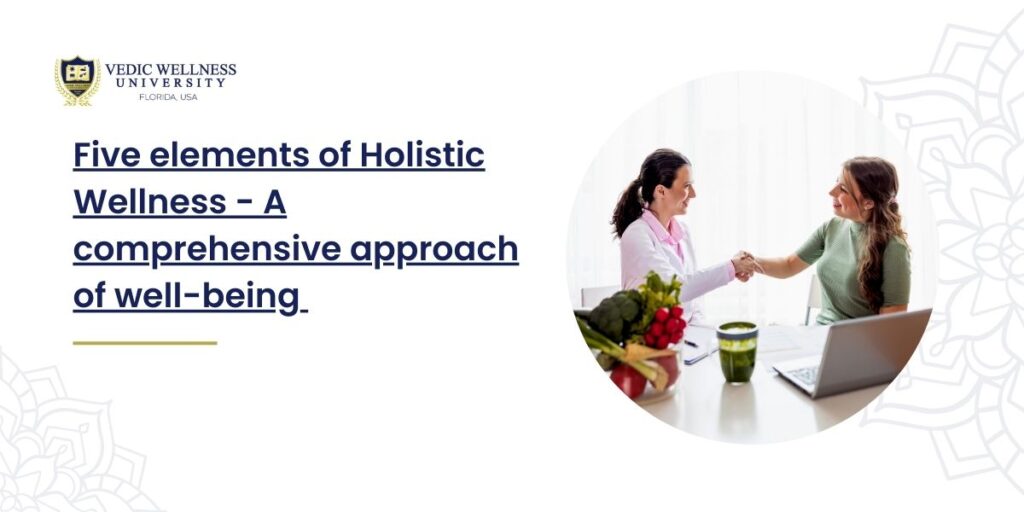
सर्वे भवन्तु सुखिनः सर्वे सन्तु निरामयाः। सर्वे भद्राणि पश्यन्तु मा कश्चिद्दुःखभाग्भवेत्।। (Sarve Bhavantu Sukhinah, Sarve Santu Niramayah, Sarve Bhadrani Pashyantu, Ma Kashcid-Duhkha-Bhag-Bhavet.) “May all beings be happy, may all be free from illness, may all see auspiciousness everywhere, and may no one suffer in any way.” – Brihadaranyaka Upanishad 1.4.14 Introduction The concept of holistic wellness is gaining global recognition as more people seek a balanced and comprehensive approach to health and well-being. Unlike conventional models of healthcare that often focus solely on physical symptoms, holistic wellness encompasses the complete person—body, mind, and spirit. It emphasizes the interconnectedness of these dimensions and the importance of achieving balance among them for optimal well-being. This blog explores the five elements of holistic wellness—Physical, Mental, Emotional, Spiritual, and Social Wellness—each playing a vital role in the overall health of an individual. Drawing from the ancient principles of Ayurveda and Vedic philosophy, we will delve into how these elements contribute to a comprehensive approach to well-being and how they align with the teachings of Vedic Wellness University. Understanding Ayurveda: The Foundation of Holistic Wellness Ayurveda, often called the “Science of Life,” is one of the world’s oldest holistic healing systems. It is based on the belief that health and wellness depend on a delicate balance between the mind, body, and spirit. The primary goal of Ayurveda is to promote good health rather than merely fight disease. This ancient science offers a framework for understanding how to maintain balance and harmony in life, which is essential for holistic wellness. Basic Principles of Ayurveda By understanding these principles, one can appreciate how Ayurveda lays the foundation for the five elements of holistic wellness. The Five Elements of Holistic Wellness The journey towards holistic wellness involves nurturing all aspects of the self—physical, mental, emotional, spiritual, and social. Each of these elements plays a unique role in our well-being and is interconnected with the others. 1. Physical Wellness: 2. Mental Wellness: 3. Emotional Wellness: 4. Spiritual Wellness: 5. Social Wellness: By integrating these elements, one can achieve a state of holistic wellness that promotes balance, harmony, and overall well-being. How Vedic Wellness University Promotes Holistic Wellness? Vedic Wellness University (VWU) is committed to spreading awareness about the ancient wisdom of Ayurveda, Yoga, and other Vedic sciences as foundational tools for achieving holistic wellness. The university offers a range of programs designed to help students understand and apply these concepts in their personal and professional lives. Courses Offered by Vedic Wellness University This program introduces students to the five elements of holistic wellness, covering physical, mental, emotional, spiritual, and social aspects. It is ideal for beginners who want to explore the principles of Ayurveda, Yoga, and holistic health. These programs provide a deeper understanding of Ayurvedic principles and their application in modern healthcare. Students learn about dosha balancing, herbal medicine, and integrative health practices that align with holistic wellness principles. For advanced learners, these programs offer research opportunities in Vedic sciences and their application in promoting holistic wellness. The curriculum includes in-depth studies of Yoga, Vedic Astrology, and Spiritual Science. VWU collaborates with educational institutions worldwide to offer specialized courses that promote holistic wellness, ensuring that the ancient wisdom of Ayurveda and Yoga reaches a global audience. How to Enroll in Vedic Wellness University Courses ? Prospective students can explore the various programs offered by VWU on their official website. The enrollment process is straightforward, with options for online and offline learning, interactive course materials, and expert faculty to guide students through their educational journey. Conclusion The concept of holistic wellness is not just a trend but a timeless approach that draws from the rich wisdom of Ayurveda, Yoga, and Vedic philosophy. By understanding and integrating the five elements of wellness—Physical, Mental, Emotional, Spiritual, and Social—individuals can achieve a state of balance and harmony that fosters overall well-being. Vedic Wellness University is dedicated to promoting this comprehensive approach to wellness through its diverse range of programs. By bridging ancient wisdom with contemporary relevance, VWU empowers students worldwide to embark on a journey of self-discovery, healing, and transformation. ॐ सर्वे भवन्तु सुखिनः। (Om Sarve Bhavantu Sukhinah) – “May all be happy.” Let us embrace the path of holistic wellness and live in harmony with ourselves and the universe.
The Future of Vedic Yoga Calculators Trends and Innovations
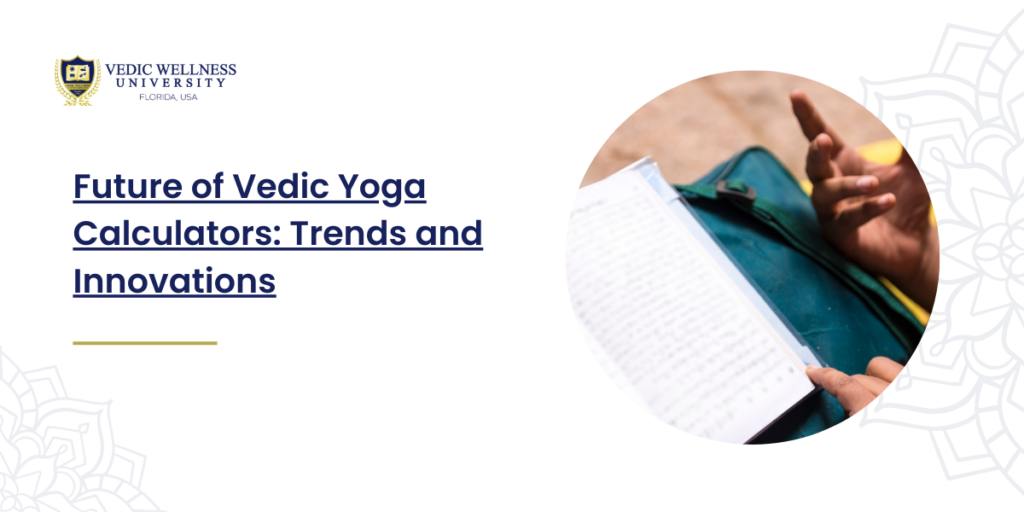
योगस्थः कुरु कर्माणि सङ्गं त्यक्त्वा धनञ्जय। सिद्ध्यसिद्ध्योः समो भूत्वा समत्वं योग उच्यते।। (Yogasthah Kuru Karmani Sangam Tyaktva Dhananjaya, Siddhyasiddhyoh Samo Bhutva Samatvam Yoga Uchyate.) “Be steadfast in yoga, O Arjuna. Perform your duty and abandon all attachment to success or failure. Such evenness of mind is called Yoga.” – Bhagavad Gita 2.48 Introduction In the ever-evolving world of technology, the ancient wisdom of the Vedic sciences is finding new ways to adapt and flourish. One such innovation is the Vedic Yoga calculator, a tool that combines the principles of Vedic astrology, Yoga, and Ayurveda to provide personalized wellness insights. These calculators are becoming increasingly popular for their ability to offer tailored guidance on yoga practices, dietary recommendations, and lifestyle changes based on one’s unique astrological chart and Ayurvedic constitution. This blog will explore the future of Vedic Yoga calculators, highlighting emerging trends and innovations in this field. We will also discuss how these calculators integrate with the foundational principles of Ayurveda, creating a comprehensive approach to holistic wellness. Further, we will delve into the categorization of these calculators, the advanced features they offer, and how they are shaping the way people around the world engage with Vedic sciences. Understanding Ayurveda and Its Connection to Vedic Yoga Calculators Before diving deeper into the advancements in Vedic Yoga calculators, it is essential to understand the basic principles of Ayurveda. Ayurveda, or the “Science of Life,” emphasizes balance in body, mind, and spirit. It is based on the theory of three primary doshas—Vata (air and space), Pitta (fire and water), and Kapha (water and earth)—that govern different physiological and psychological functions in the body. Fundamental Principles of Ayurveda Relevant to Vedic Yoga Calculators The integration of Ayurveda with Vedic astrology through these calculators provides a unique approach to wellness that goes beyond traditional methods. The Evolution and Functionality of Vedic Yoga Calculators With the rise of digital tools and applications, the Vedic Yoga calculator is emerging as a valuable resource for those seeking a holistic approach to health and spirituality. These calculators blend ancient wisdom with modern technology, offering a user-friendly interface to access deep insights into one’s health and well-being. Key Features of Vedic Yoga Calculators Trends and Innovations in Vedic Yoga Calculators As the demand for personalized wellness solutions grows globally, the Vedic Yoga calculator is undergoing several innovations to make it more accessible, accurate, and effective. Here are some key trends shaping the future of this field: 1. Integration with Artificial Intelligence (AI) and Machine Learning: 2. Enhanced User Interfaces and Virtual Assistants: 3. Holistic Health Tracking and Integration with Wearable Devices: 4. Global Accessibility and Multilingual Support: Vedic Wellness University: Leading the Way in Integrating Vedic Sciences and Technology Vedic Wellness University (VWU) is dedicated to promoting ancient Vedic wisdom and its integration with modern technological innovations. As a pioneer in Vedic studies, VWU offers a range of programs that provide deep insights into Vedic astrology, Ayurveda, Yoga, and holistic wellness. Courses Offered by Vedic Wellness University This unique program introduces students to the concept of Vedic calculators, their development, and applications. It covers the fundamentals of Vedic astrology, yoga, and Ayurveda, along with technological innovations in this field. These programs delve deeper into the intersection of Vedic sciences and technology. Students learn how to apply Vedic principles using digital tools like Vedic calculators to provide personalized wellness solutions. For advanced scholars, this program offers an opportunity to conduct original research on the integration of ancient wisdom with modern technology. It explores the future of tools like Vedic Yoga calculators in holistic health management. VWU collaborates with educational institutions worldwide to offer courses that combine Vedic knowledge with modern technology, ensuring a global reach for these innovative programs. How to Enroll in Vedic Wellness University Courses Prospective students can explore the various courses offered by VWU through their official website. The enrollment process is straightforward, with flexible learning options, interactive course materials, and expert faculty to guide students on their journey toward mastering Vedic sciences and digital wellness technologies. Conclusion The future of Vedic Yoga calculators is bright and promising, blending the timeless wisdom of Vedic sciences with cutting-edge technological innovations. As these tools continue to evolve, they offer unparalleled opportunities for personalized wellness, integrating astrology, Ayurveda, and yoga to provide comprehensive health insights. With trends such as AI integration, enhanced user interfaces, wearable device synchronization, and global accessibility, Vedic Yoga calculators are set to revolutionize the way we approach holistic health. Vedic Wellness University remains at the forefront of this exciting field, committed to spreading awareness of Vedic knowledge and its modern applications. By offering specialized courses, VWU empowers individuals worldwide to harness the power of ancient wisdom through modern technology, paving the way for a healthier, more balanced life. स्वस्थस्य स्वास्थ्य रक्षणं, आतुरस्य विकार प्रशमनं। (Swasthasya Swasthya Rakshanam, Aturasya Vikar Prashamanam.) “The aim of Ayurveda is to maintain the health of the healthy and to alleviate the disorders of the diseased.” – Charaka Samhita
How are Ayurveda and Yoga Related
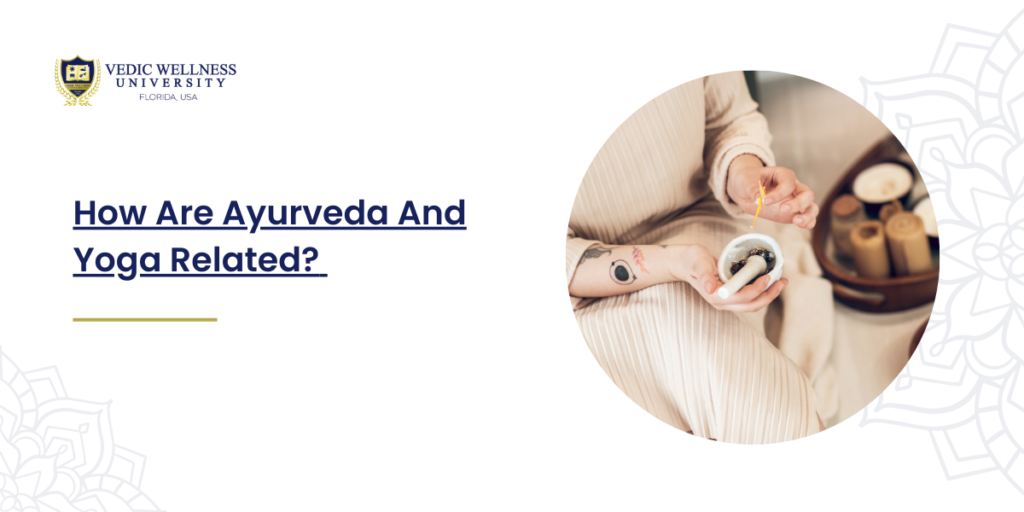
धन्यास्ते यो योगेन जीवनं परिपालयन्ति। स्वशरीरं शरीरं च सृष्टेः स्वात्मनः संस्थानं। (Dhanyaste Yo Yogena Jeevanam Paripalayanti, Swasariram Shariram Cha Srishtheh Swatmanah Sansthanam.) “Blessed are those who sustain their lives through Yoga, recognizing the body as the abode of the soul.” – Hatha Yoga Pradipika Introduction Ayurveda and Yoga are two interconnected branches of ancient Indian wisdom that provide a comprehensive and holistic approach to health and well-being. Both sciences, rooted in the Vedic tradition, focus on harmonizing the body, mind, and spirit to achieve a state of balance and wellness. While Yoga primarily emphasizes physical postures, breathing exercises, and meditation to promote spiritual and mental health, Ayurveda is the science of life that focuses on maintaining balance in the body through diet, lifestyle, and herbal remedies. In recent years, the international community has shown a growing interest in these ancient practices, recognizing the benefits of integrating yoga and ayurveda for holistic health. This blog explores the profound relationship between yoga and ayurveda, detailing their principles, categorizations, and how they work together to foster overall well-being. Understanding Ayurveda: The Science of Life Ayurveda, which translates to “the science of life,” is a 5,000-year-old system of natural healing that originated in India. It is based on the principle that health and wellness depend on a delicate balance between the mind, body, and spirit. Ayurveda is not just about treating diseases; it is a way of life that promotes longevity, vitality, and spiritual awareness. Basic Principles of Ayurveda These principles lay the foundation for integrating Ayurveda with Yoga, as both systems aim to balance the body’s energies and promote holistic health. Yoga: The Path to Union Yoga, which means “union,” is a spiritual and physical discipline that integrates the body, mind, and spirit. It encompasses a range of practices, including physical postures (asanas), breath control (pranayama), meditation (dhyana), and ethical principles (yamas and niyamas). Yoga is not merely a physical exercise; it is a path to self-realization and spiritual growth. Key Aspects of Yoga and Their Connection to Ayurveda By combining these aspects, yoga and ayurveda provide a comprehensive approach to wellness that addresses the physical, mental, and spiritual dimensions of health. The Interconnection of Ayurveda and Yoga Yoga and Ayurveda are often referred to as “sister sciences” because they both originate from the Vedic tradition and share a common goal—achieving harmony and balance in life. When integrated, these two sciences offer a more profound path to healing and self-realization. How Yoga and Ayurveda Complement Each Other Categories of Integrative Yoga and Ayurveda Practices Combining yoga and ayurveda offers a variety of practices that can be tailored to individual needs. These practices are categorized based on their objectives and the specific dosha they target. 1. Vata-Pacifying Yoga and Ayurveda Practices: 2. Pitta-Balancing Yoga and Ayurveda Practices: 3. Kapha-Reducing Yoga and Ayurveda Practices: By following these integrative practices, individuals can experience the full spectrum of benefits that yoga and ayurveda have to offer. Vedic Wellness University: Promoting Yoga and Ayurveda for Holistic Wellness Vedic Wellness University (VWU) is at the forefront of promoting the integration of yoga and ayurveda as essential components of holistic wellness education. VWU offers a wide range of courses designed to cater to students from around the world, making ancient Vedic knowledge accessible to everyone.
The Art of Veda Recitation: Fueling Creative Expression
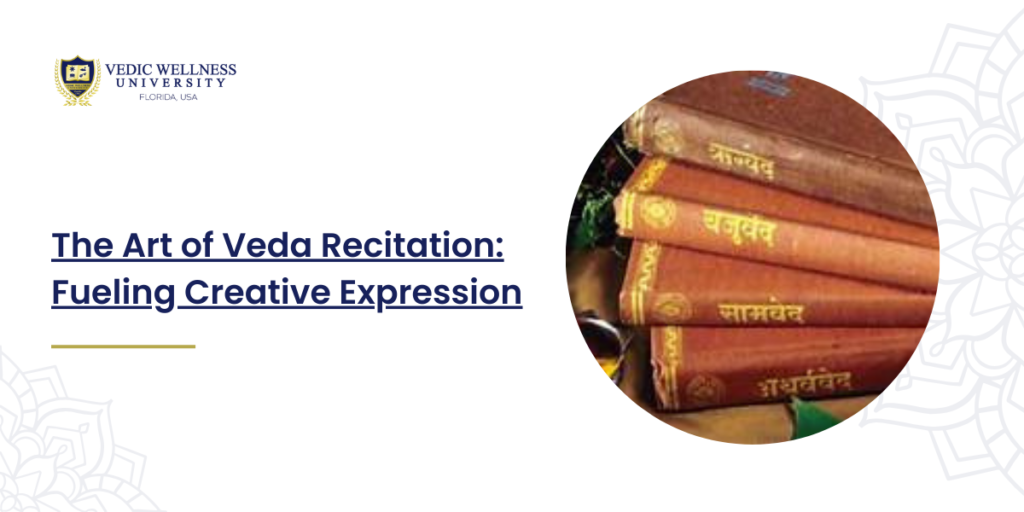
स्वाध्यायान्मा प्रमदः। (Swadhyayan Ma Pramadah) “Do not neglect self-study and recitation.” – Taittiriya Upanishad 1.11.1 Introduction The Art of Veda Recitation is a timeless tradition that transcends mere chanting. It is an intricate practice that involves precise pronunciation, rhythmic patterns, and deep spiritual connection. Originating from the ancient Vedic texts, this art form not only preserves the knowledge of the Vedas but also enhances one’s creative and spiritual expression. For centuries, the sacred Vedic practices have been revered for their ability to connect the practitioner with divine wisdom, elevate consciousness, and foster a sense of inner peace. In today’s global context, the significance of Veda recitation extends beyond cultural preservation—it is becoming a medium for creative spiritual expression and a tool for holistic wellness. This blog explores the profound impact of Vedic chanting techniques, the benefits of Veda recitation, and how the Art of Veda is a conduit for creative and spiritual expression. Through the lens of international perspectives, we delve into the categories of Vedic recitations, their relevance to modern practitioners, and how Vedic Wellness University is committed to preserving and promoting this ancient art. The Spiritual and Creative Dimensions of Veda Recitation Vedic chanting, or Vedadhyayana, is an ancient practice deeply rooted in the traditions of the Vedic culture. This practice is not only a method of preserving the sacred texts but also a pathway to spiritual awakening and creative expression. As the Rig Veda states: इन्द्रं वर्धन्तो अप्तुरः कृष्टीनां वीर्यं महत्। (Indram Vardhanto Apturah Krishtinam Veeryam Mahat) “Strengthen Indra, the mighty doer, for great deeds among people.” – Rig Veda 1.4.1 Vedic Chanting Techniques: Bridging the Mundane and the Divine The precise Vedic chanting techniques are designed to maintain the purity of the texts and their vibrational impact. These techniques require rigorous discipline and a deep understanding of phonetics, pitch, and intonation. The phonetic beauty of the Art of Veda lies in its ability to resonate with the cosmic vibrations, aligning the individual’s consciousness with universal energies. This alignment not only benefits spiritual growth but also serves as a creative spiritual expression that nurtures the soul. The creative expression manifested through Veda recitation is akin to an art form—one that combines devotion, discipline, and a profound understanding of sound and rhythm. The intricate patterns of Vedic chanting are believed to have a direct effect on the energy centers or chakras in the body, promoting balance, healing, and spiritual elevation. Sacred Vedic Practices: The Foundation of Holistic Wellness Sacred Vedic practices, such as the recitation of the Vedas, are deeply intertwined with the principles of Ayurveda. According to Ayurveda, the body, mind, and spirit are interconnected, and health is achieved when there is harmony between these elements. Veda recitation plays a crucial role in this holistic approach by purifying the mind and elevating the spirit, thus promoting overall well-being. Basic Principles of Ayurveda and Their Relevance to Veda Recitation: Categories of Veda Recitation and Their Unique Benefits The Art of Veda encompasses various styles and methods of recitation, each serving a distinct purpose. These categories are vital for advanced learners who seek to deepen their understanding of this sacred practice. 1. Samhita Paatha (Basic Recitation): This is the simplest form of Vedic recitation, where the verses are chanted in a straightforward manner. The focus is on correct pronunciation and maintaining the original intonations. 2. Padha Paatha (Word-by-Word Recitation): In this method, each word is chanted separately to maintain clarity and understanding of the individual components of the verses. 3. Krama Paatha (Sequential Recitation): This style involves chanting the verses in a specific sequence, emphasizing the rhythmic patterns and flow. 4. Jata Paatha (Complex Recitation): This advanced technique involves complex patterns where the words are repeated in a particular sequence to create a web-like structure of sound. 5. Ghana Paatha (Singing Recitation): This is one of the most advanced forms of Vedic recitation, where the verses are sung in a melodic fashion, resembling a musical rendition. The Role of Vedic Wellness University in Promoting the Art of Veda Vedic Wellness University is committed to preserving the Art of Veda through its comprehensive courses and programs. The university integrates ancient Vedic education with modern practices, providing a holistic approach to learning. Courses Offered at Vedic Wellness University By offering these diverse programs, Vedic Wellness University ensures that the rich tradition of Veda recitation is preserved and promoted on a global scale. Conclusion The Art of Veda is not merely an ancient practice; it is a living tradition that continues to inspire and uplift individuals around the world. Through Vedic chanting techniques, practitioners can experience a deep connection to the divine, foster creative spiritual expression, and achieve holistic wellness. The sacred Vedic practices provide a pathway to inner peace, self-realization, and creative fulfillment. For those interested in exploring the depths of this sacred art, Vedic Wellness University offers a unique opportunity to learn, practice, and preserve the Art of Veda. By integrating traditional wisdom with contemporary relevance, the university is dedicated to spreading awareness of this ancient practice and ensuring that its profound benefits are accessible to all who seek them. Embrace the journey of Vedic recitation, fuel your creative expression, and connect with the timeless wisdom of the Vedas. Through the art of Veda, let your soul resonate with the eternal vibrations of the universe.
The Connection Between Spirituality and Mental Health: Bridging Science and Spirituality
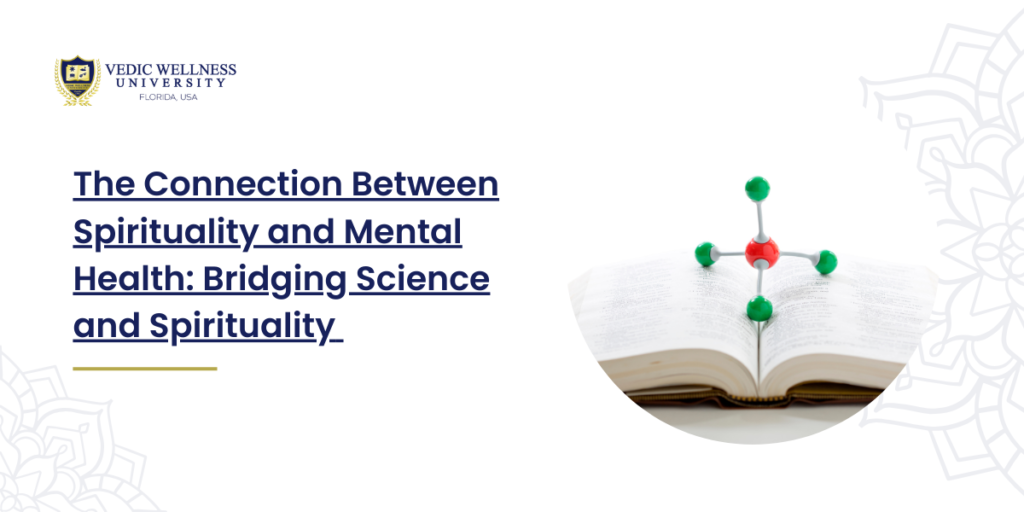
मन एव मनुष्याणां कारणं बन्धमोक्षयोः। (Manah Eva Manushyanam Karanam Bandha Mokshayoh) “The mind alone is the cause of bondage and liberation for human beings.” – Amritabindu Upanishad 2 Introduction The relationship between spirituality and mental health has intrigued scholars, philosophers, and scientists for centuries. As our understanding of mental health evolves, it becomes increasingly evident that a purely scientific approach may not be sufficient to address the complexities of human well-being. Integrating science and spirituality offers a more comprehensive view, acknowledging that mental health encompasses not only biological and psychological factors but also spiritual dimensions. This blog explores the profound connection between spirituality and mental health, emphasizing the synergy between science and spirituality. Drawing from the principles of Ayurveda, Yoga, and Vedic philosophy, we will delve into how spiritual practices can enhance mental well-being and how Vedic Wellness University is committed to promoting these teachings on a global scale. Ayurveda: The Science of Life and Its Relevance to Mental Health Ayurveda, one of the world’s oldest holistic healing systems, provides a unique perspective on mental health by integrating mind, body, and spirit. Known as the “Science of Life,” Ayurveda emphasizes the balance of the three doshas—Vata (air and space), Pitta (fire and water), and Kapha (water and earth)—for optimal health. These doshas not only influence our physical health but also affect our mental and emotional states. Basic Principles of Ayurveda Related to Mental Health These principles form the basis for understanding how integrating science and spirituality can offer a more holistic approach to mental health. The Interplay Between Spirituality and Mental Health Spirituality, often defined as the search for meaning and purpose in life, involves connecting with something greater than oneself. This connection can take various forms, such as meditation, prayer, yoga, or engaging in acts of compassion and kindness. Numerous studies have shown that spirituality can have a positive impact on mental health by reducing stress, anxiety, and depression, and promoting a sense of peace and well-being. How Science and Spirituality Complement Each Other in Mental Health By understanding how spirituality impacts mental health, we can appreciate the need for integrating scientific and spiritual approaches to achieve comprehensive healing. Categories of Spiritual Practices and Their Impact on Mental Health Spiritual practices are diverse and cater to different aspects of mental well-being. They can be broadly categorized based on their objectives and the specific benefits they offer for mental health. 1. Meditation and Mindfulness Practices: 2. Yoga and Pranayama: 3. Chanting and Mantras: 4. Service and Compassion (Seva): By incorporating these spiritual practices, individuals can achieve a harmonious balance between science and spirituality, leading to better mental health outcomes. Vedic Wellness University: Promoting Science and Spirituality for Mental Well-being Vedic Wellness University (VWU) is dedicated to promoting the integration of science and spirituality as a foundation for holistic mental health. The university offers a range of courses that delve into the principles of Ayurveda, Yoga, Spiritual Science, and Vedic philosophy, emphasizing the importance of mental, emotional, and spiritual well-being. Courses Offered by Vedic Wellness University How to Enroll in Vedic Wellness University Courses Prospective students can explore the various programs offered by VWU through the official website. The enrollment process is straightforward, with flexible learning options, expert faculty guidance, and access to comprehensive course materials. Conclusion The connection between spirituality and mental health is an area of growing interest and importance in today’s world. By bridging science and spirituality, we can address mental health in a more holistic and effective way, considering the mind, body, and spirit as a unified whole. Spiritual practices such as meditation, yoga, chanting, and selfless service provide valuable tools for achieving mental clarity, emotional stability, and overall well-being. Vedic Wellness University is at the forefront of this movement, promoting an integrative approach to mental health that combines ancient wisdom with modern science. By offering a range of courses, VWU empowers individuals worldwide to explore the profound connection between spirituality and mental health and embark on a journey of healing and transformation. **ॐ शान्तिः शान्त
What does 3rd house represent in vedic astrology
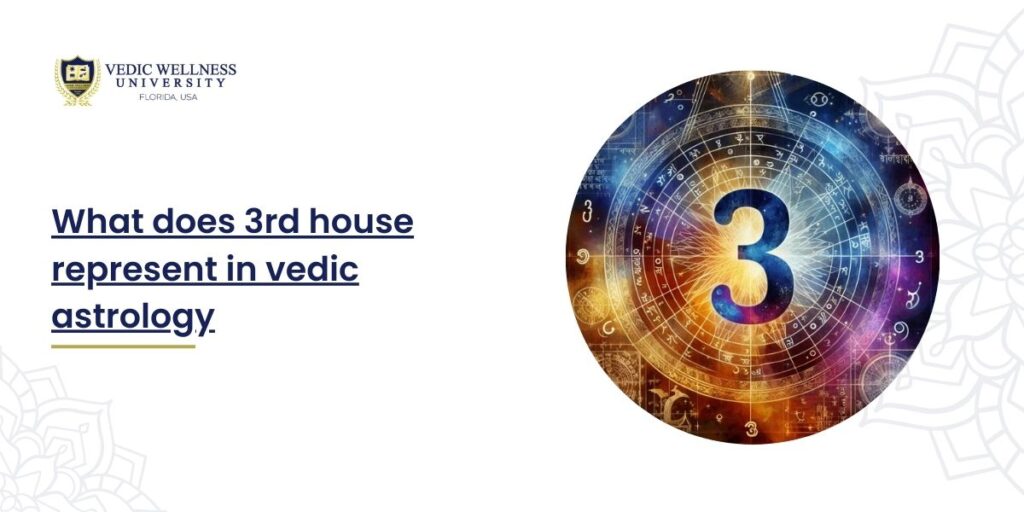
सर्वं खल्विदं ब्रह्म तज्जलानिति शान्त उपासीत। (Sarvam Khalvidam Brahma Tajjalaniti Shanta Upasita) “Everything is indeed Brahman. Let a man calmly meditate upon this.” – Chandogya Upanishad 3.14.1 Introduction Vedic astrology, or Jyotish Shastra, is an ancient science that provides deep insights into human life, destiny, and spiritual growth. It is based on the premise that the positions of celestial bodies at the time of one’s birth have a profound impact on various aspects of life. Among the twelve Vedic astrology houses in a horoscope, each house holds unique significance and governs specific areas of life. The third house, or Sahaj Bhava, is often associated with communication, courage, and personal growth. This blog delves into the third house significance in Vedic astrology, exploring how this house governs our communication skills, intellect, short journeys, and relationships with siblings. We will also discuss how the basic principles of Ayurveda, another pillar of ancient Indian wisdom, interconnect with the cosmic energies represented by the houses in Vedic astrology. Furthermore, we will shed light on how Vedic Wellness University is committed to promoting awareness of Vedic sciences and offering comprehensive courses on these topics for a global audience. Understanding the Basic Principles of Ayurveda and Their Relevance to Vedic Astrology Ayurveda, the science of life, is based on maintaining balance in the body, mind, and spirit. It shares a deep connection with Vedic astrology, as both sciences originate from the Vedic texts and emphasize harmony with nature. Ayurveda outlines three fundamental bio-energies or Doshas—Vata, Pitta, and Kapha—which govern various physiological and psychological functions in the body. Relevance of Ayurveda to the Vedic Astrology Houses In Vedic astrology, each of the twelve houses is associated with specific body parts and health aspects, providing valuable insights into one’s physical and mental well-being. Understanding these connections helps practitioners of Vedic astrology and Ayurveda to align their physical, mental, and spiritual practices, achieving holistic wellness. The Third House in Vedic Astrology: Significance and Meaning The third house, or Sahaj Bhava, is a crucial house in Vedic astrology houses that represents communication, courage, creativity, short journeys, siblings, and skills. The 3rd house meanings are deeply interconnected with how one interacts with the world, how one expresses thoughts, and how one takes action to achieve goals. Key Aspects Governed by the Third House The Impact of Planets in the Third House The planets placed in the third house can greatly influence the third house significance in an individual’s birth chart. Here are some examples: How Vedic Wellness University Promotes the Study of Vedic Astrology? Vedic Wellness University is deeply committed to spreading awareness and knowledge of ancient Indian sciences like Vedic astrology and Ayurveda. By offering specialized courses in these fields, the university aims to integrate traditional wisdom with modern education to provide a comprehensive learning experience. Courses Offered at Vedic Wellness University By offering these courses, Vedic Wellness University ensures that students gain a deep understanding of the Vedic astrology houses, including the third house, and how they shape human life and destiny. Conclusion The third house in Vedic astrology, with its emphasis on communication, courage, and creativity, plays a pivotal role in shaping one’s personal and professional life. Understanding the 3rd house meanings provides profound insights into how we express ourselves, relate to others, and navigate life’s challenges. By integrating the principles of Ayurveda, we can achieve a harmonious balance that enhances the positive aspects governed by the third house. Vedic Wellness University, with its dedication to promoting Vedic sciences, offers a platform for global learners to explore these ancient wisdom traditions. Whether you are interested in astrology, Ayurveda, or other Vedic studies, the university provides a holistic approach to education that blends traditional knowledge with modern relevance. Enroll today and embark on a journey of self-discovery and spiritual growth through the profound teachings of Vedic astrology. May the wisdom of the stars guide you on your path to self-realization. ओम् शान्तिः शान्तिः शान्तिः। (Om Shanti Shanti Shanti)
Yoga Therapy and Ayurveda The Meaning of Yoga Chikitsa
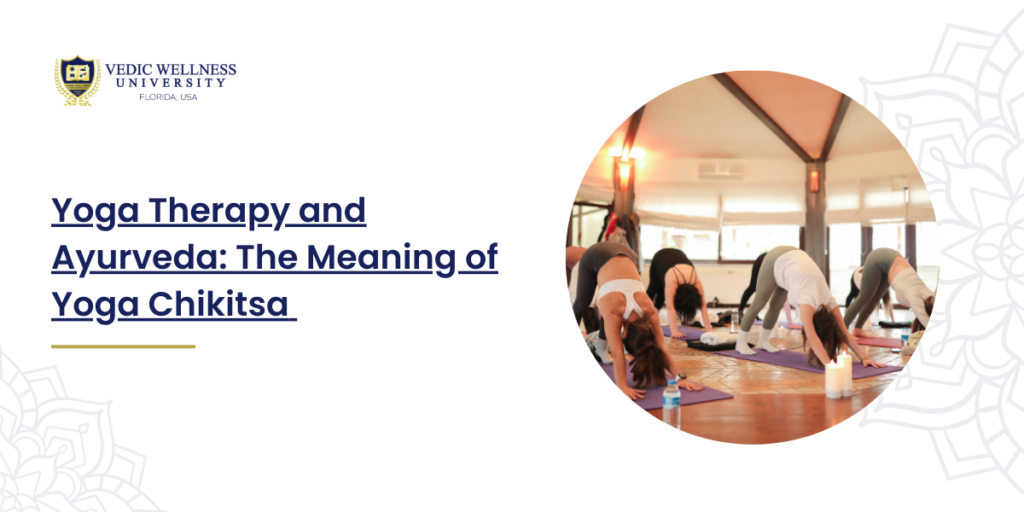
क्ताहारविहारस्य युक्तचेष्टस्य कर्मसु। युक्तस्वप्नावबोधस्य योगो भवति दुःखहा।। (Yuktahara Viharasya Yuktacheshtasya Karmasu, Yuktasvapnavabodhasya Yogo Bhavati Duhkhaha.) “For one who is moderate in eating and recreation, balanced in work and regulated in sleep, Yoga destroys all sorrow.” – Bhagavad Gita 6.17 Introduction Yoga and Ayurveda are two interconnected branches of ancient Indian wisdom that provide a holistic approach to health and well-being. In recent years, there has been a growing global interest in these ancient sciences as more people seek natural ways to achieve balance and harmony in their lives. Central to this holistic approach is Yoga Therapy, known in Sanskrit as Yoga Chikitsa. This blog will explore the meaning of Yoga Therapy, its benefits, and its integration with Ayurveda to provide a comprehensive understanding of health. Yoga Therapy focuses on using yoga practices as a therapeutic tool to address physical, mental, and emotional imbalances. When combined with Ayurveda, the science of life, it creates a powerful synergy that promotes healing and well-being. This blog will delve into the benefits of yoga therapy, provide a detailed yoga therapy definition, and highlight the health benefits of yoga as understood through the lens of Ayurveda. The Principles of Ayurveda and Their Connection to Yoga Therapy Ayurveda, the ancient Indian system of medicine, is based on the principles of balance and harmony within the body, mind, and spirit. According to Ayurveda, health is achieved when there is a balance between the three fundamental energies or Doshas—Vata (air and space), Pitta (fire and water), and Kapha (water and earth). An imbalance in these doshas leads to illness, and the goal of Ayurvedic practices, including Yoga Therapy, is to restore balance. Basic Principles of Ayurveda and Their Relevance to Yoga Therapy By integrating these principles, Yoga Therapy serves as a bridge that connects physical health with mental and spiritual wellness, providing a holistic approach to healing. Understanding Yoga Therapy: Definition and Benefits Yoga Therapy is a specialized field within the broader discipline of yoga that focuses on adapting traditional yoga practices to address specific health conditions. Unlike general yoga classes, Yoga Therapy is individualized, taking into account a person’s physical, mental, and emotional needs. The aim is to use yoga as a therapeutic intervention to promote healing, prevent illness, and enhance overall well-being. Yoga Therapy Definition and Its Unique Approach Health Benefits of Yoga Therapy The health benefits of yoga are well-documented and cover a wide range of physical, mental, and emotional aspects. Categories of Yoga Therapy Practices in Ayurveda Yoga Therapy can be broadly categorized into several types based on the goals of the practice and the specific needs of the individual. These categories help practitioners understand how to tailor their approach for maximum benefit. 1. Therapeutic Yoga for Physical Health: 2. Breathwork and Pranayama for Respiratory Health: 3. Meditation and Mindfulness for Mental Health: 4. Integrative Therapy for Holistic Health: Vedic Wellness University: Promoting Yoga Therapy and Ayurveda Vedic Wellness University (VWU) is at the forefront of promoting Yoga Therapy and Ayurveda as essential components of holistic wellness education. With a focus on integrating ancient Vedic knowledge with modern practices, VWU offers a wide range of courses that cater to students from around the globe. Courses Offered by Vedic Wellness University How to Enroll in Vedic Wellness University Courses Interested students can visit the VWU website, explore the courses, and select the program that best suits their interests and career goals. With a user-friendly enrollment process, flexible learning schedules, and access to expert faculty, VWU ensures a seamless educational experience for all its students. Conclusion Yoga Therapy and Ayurveda, with their deep roots in ancient Indian philosophy, offer a comprehensive approach to health and wellness that is both timeless and relevant. As the world moves towards natural and holistic methods of healing, the significance of Yoga Therapy is becoming more widely recognized. By understanding the yoga therapy definition and its integration with Ayurveda, individuals can harness the full potential of these ancient sciences to achieve balance, harmony, and well-being. Vedic Wellness University is dedicated to spreading this ancient wisdom through its diverse range of courses, making
Lord Shiva in Vedic Astrology
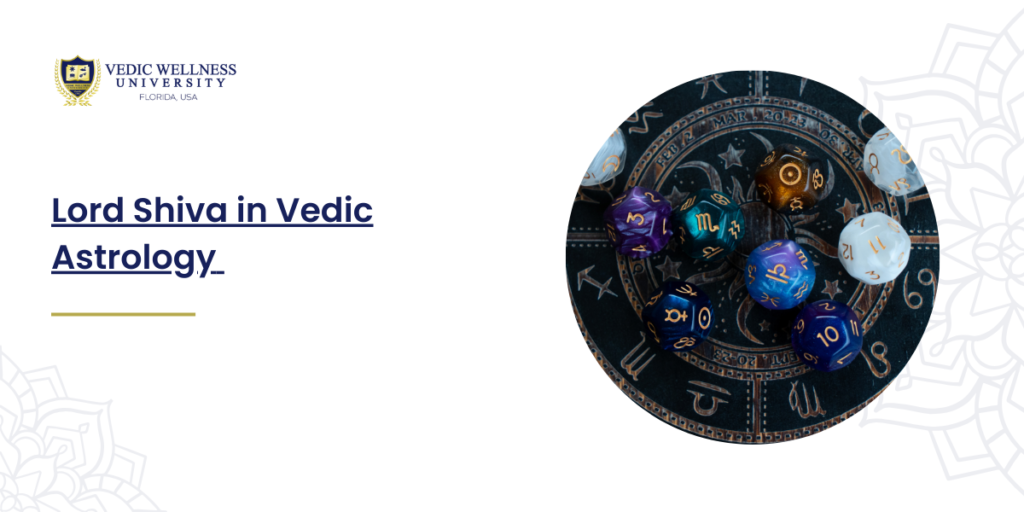
नमः शम्भवाय च मयोभवाय च नमः शङ्कराय च मयस्कराय च। नमः शिवाय च शिवतराय च। (Namah Shambhavaya Cha Mayobhavaya Cha Namah Shankaraya Cha Mayaskaraya Cha. Namah Shivaya Cha Shivataraaya Cha.) “Salutations to the auspicious one, the source of happiness, the beneficent one, and the most auspicious among all.” – Sri Rudram, Yajurveda Introduction Lord Shiva, one of the principal deities of Hinduism, holds a unique place in the realm of spirituality and Vedic knowledge. Known as the destroyer of evil, the transformer, and the supreme yogi, Shiva represents the cyclical nature of the universe—creation, preservation, and destruction. In Vedic astrology, Shiva’s cosmic influence is profound and all-encompassing. As the lord of transformation, he governs various planetary energies, guiding individuals on their spiritual journey, influencing their karma, and helping them navigate life’s challenges. This blog will explore the significance of Lord Shiva in Vedic astrology, particularly how his energies manifest through the Vedic astrology houses. It will also delve into the third house significance, including its meanings and role in communication. Understanding these concepts from a Vedic perspective provides a comprehensive view of how the divine and the cosmic are interconnected. Ayurveda and Its Connection to Vedic Astrology Before delving deeper into the role of Lord Shiva in Vedic astrology, it’s essential to understand the fundamental principles of Ayurveda, as these ancient sciences are intertwined. Ayurveda, the science of life, emphasizes maintaining balance in the body, mind, and spirit. Just like astrology, it is based on the concept that cosmic energies influence human health and behavior. Fundamental Principles of Ayurveda and Relevance to Vedic Astrology By integrating Ayurveda with astrology, practitioners can better understand an individual’s constitution, health tendencies, and how to harness cosmic energies for well-being. The Role of Lord Shiva in Vedic Astrology Lord Shiva, the cosmic yogi, is intricately woven into the fabric of Vedic astrology. He represents the ultimate reality (Brahman), the consciousness that pervades all of creation. His influence spans across various aspects of life, guiding souls toward liberation (moksha) and transformation. Lord Shiva and His Influence on Vedic Astrology Houses How Shiva Mantras Influence the Vedic Astrology Houses Chanting Shiva mantras can activate and balance specific energies associated with various Vedic astrology houses. For instance: The Third House in Vedic Astrology and Its Connection to Shiva The third house in Vedic astrology plays a pivotal role in one’s ability to communicate, express, and take courageous actions. It is a house that embodies the courage to face life, explore new territories, and express one’s truth. The 3rd house meanings include communication skills, relationships with siblings, short travels, and artistic talents. Vedic Wellness University: Promoting Vedic Astrology and Shiva’s Teachings Vedic Wellness University (VWU) is dedicated to spreading awareness about ancient Vedic sciences, including Vedic astrology, Ayurveda, and spiritual practices centered around deities like Lord Shiva. By offering a range of online and offline courses, VWU ensures that this timeless wisdom is accessible to learners worldwide. Courses Offered by Vedic Wellness University This course introduces students to the basics of Vedic astrology houses, planetary influences, and astrological predictions. It includes detailed discussions on the significance of deities like Shiva and their cosmic impact. These programs cover advanced topics, such as the influence of deities in Vedic astrology, detailed analysis of the twelve houses, and remedial measures to strengthen planetary influences. For scholars interested in deep research, this program offers an opportunity to explore the connections between Vedic deities, astrology, and spiritual practices. It provides a comprehensive understanding of how cosmic energies and divine influences shape human experiences. VWU collaborates with global educational institutions to offer specialized courses, enabling a broader audience to learn and benefit from ancient Vedic wisdom. How to Enroll in Vedic Wellness University Courses Enrolling in VWU’s courses is straightforward. Prospective students can visit the university’s website, explore the various programs, and choose a course that aligns with their interests. With expert guidance from experienced faculty, interactive content, and flexible schedules, VWU provides an enriching educational experience. Conclusion Lord Shiva, with his immense spiritual and cosmic significance, holds a unique place in Vedic astrology. His influence spans multiple houses, guiding individuals toward transformation, liberation, and spiritual awakening. Understanding Shiva’s role within the framework of Vedic astrology houses provides profound insights into one’s karmic path and spiritual evolution. Vedic Wellness University remains committed to promoting the teachings of Lord Shiva and other Vedic deities through its comprehensive courses. By bridging ancient wisdom with contemporary learning, VWU empowers students worldwide to explore the depths of Vedic astrology and achieve holistic growth. ॐ नमः शिवाय। (Om Namah Shivaya) – May the blessings of Lord Shiva guide you on your spiritual journey.
The Spiritual and Linguistic Beauty of Sanskrit
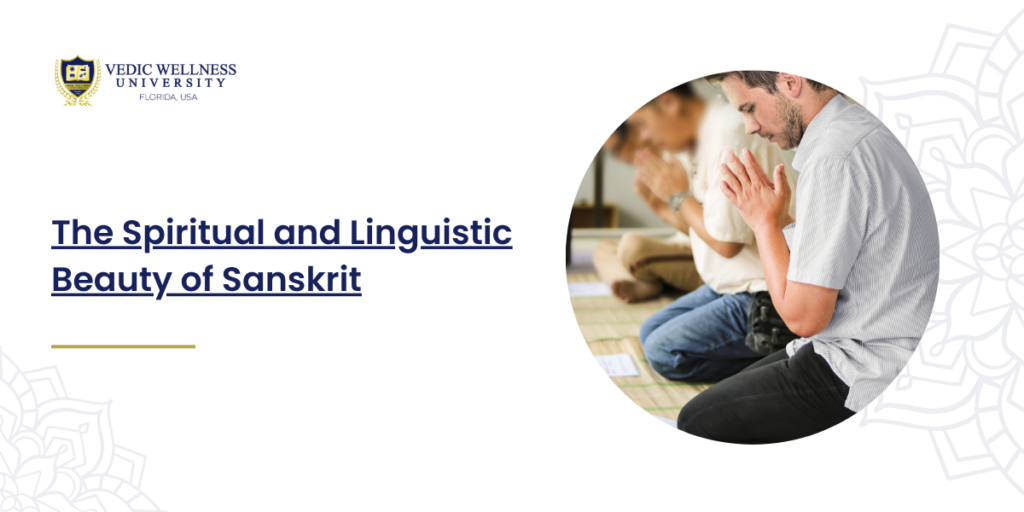
शब्दब्रह्मा विभाजनं नास्ति (Shabda Brahma Vibhajanam Naasti) “The word is Brahman, undivided and whole.” – Rig Ved Introduction Sanskrit, often referred to as the language of the gods, holds a sacred place in the heart of ancient Indian philosophy, spirituality, and education. Its profound beauty lies not only in its rich vocabulary and linguistic structure but also in its spiritual depth and the meditative practices it inspires. As the foundational language of the Vedas, Upanishads, and countless other sacred texts, Sanskrit is the cornerstone of traditional education in India and, increasingly, around the world. The relevance of Sanskrit has been reinvigorated today as more and more people globally are realizing the depth of spiritual teachings, linguistic beauty, and cultural wisdom embedded in this ancient language. By offering Sanskrit courses, institutions like Vedic Wellness University aim to keep this ancient wisdom alive and accessible. This blog explores the spiritual and linguistic beauty of Sanskrit, emphasizing its global appeal and relevance in modern times. The Foundations of Sanskrit: Linguistic Beauty and Spiritual Depth The essence of Sanskrit lies in its meticulous structure and profound spiritual teachings. A verse from the Bhagavad Gita aptly summarizes the spiritual potency of the language: ध्यानेनात्मनि पश्यन्ति केचिदात्मानमात्मना। (Dhyanenatmani Pashyanti Kechidatmanam Atmana) “Some perceive the Self within themselves through meditation.” – Bhagavad Gita 13.25 The linguistic beauty of Sanskrit is unparalleled. It is a language that transcends mere communication; it is a tool for spiritual enlightenment. The phonetic perfection and grammatical precision of Sanskrit have a unique impact on the mind and soul, creating an environment conducive to meditative practices. Every word in Sanskrit is believed to carry a vibrational essence that resonates with the cosmic consciousness, enhancing one’s spiritual journey. Meditative Practices Through Sanskrit Chanting One of the unique aspects of Sanskrit is its use in meditative practices. Chanting Sanskrit verses or mantras can serve as a powerful tool for meditation. The rhythmic pattern of Sanskrit poetry, coupled with its phonetic structure, allows individuals to attain higher states of consciousness. Unlike modern languages, which primarily focus on semantics, the sound vibrations in Sanskrit are said to have healing and calming effects, making it ideal for spiritual and meditative practices. The Role of Traditional Education in Preserving Sanskrit Traditional education systems, especially those rooted in Vedic practices, have always emphasized the study of Sanskrit. Institutions like the Vedic Wellness University play a crucial role in promoting Sanskrit courses as part of a broader curriculum that integrates both ancient wisdom and contemporary relevance. Students from around the globe are now exploring Sanskrit not only to learn a language but also to delve into the philosophical, spiritual, and cultural treasures it holds. The Spiritual Teachings and Philosophical Essence of Sanskrit Sanskrit is not just a language but a profound repository of spiritual teachings. The Vedas, Upanishads, and Puranas, all written in Sanskrit, contain the essence of Indian spiritual philosophy. These texts encompass various dimensions of existence, from the physical to the metaphysical, providing a comprehensive understanding of life and the universe. असतो मा सद्गमय, तमसो मा ज्योतिर्गमय, मृत्योर्मामृतं गमय। (Asato Ma Sadgamaya, Tamaso Ma Jyotirgamaya, Mrityor Maamritam Gamaya) “Lead me from the unreal to the real, from darkness to light, from death to immortality.” – Brihadaranyaka Upanishad 1.3.28 Categorization of Sanskrit Literature The vast body of Sanskrit literature is broadly categorized into two types: Shruti (that which is heard) and Smriti (that which is remembered). The Significance of Sanskrit Poetry Sanskrit poetry, known for its rich imagery and metaphorical depth, captures the spiritual essence of human existence. Poets like Kalidasa and Bhartrihari have contributed immensely to the tradition of Sanskrit literature, blending linguistic beauty with profound philosophical insights. Sanskrit poetry is not just an art form; it is a spiritual experience that engages the reader’s mind, soul, and emotions. Vedic Wellness University: Promoting Sanskrit and Traditional Education Vedic Wellness University stands at the forefront of promoting traditional education that integrates ancient Vedic wisdom with modern learning methodologies. The university offers a variety of Sanskrit courses that cater to students from all backgrounds, ranging from beginners to advanced scholars. Courses Offered at Vedic Wellness University By offering these diverse programs, Vedic Wellness University ensures that the rich legacy of Sanskrit and its associated spiritual teachings continue to inspire and enlighten future generations. Conclusion Sanskrit, with its profound linguistic beauty and spiritual teachings, is much more than a language—it is a path to self-realization and inner peace. As global interest in traditional education, meditative practices, and spiritual teachings continues to grow, the relevance of Sanskrit becomes even more apparent. Institutions like Vedic Wellness University are playing a vital role in keeping this ancient language alive, ensuring that its wisdom and beauty are accessible to all who seek it. For those interested in exploring the depth of Sanskrit, the courses offered by Vedic Wellness University provide a unique opportunity to engage with this sacred language in a holistic and meaningful way. Through dedicated study and practice, one can truly appreciate the spiritual and linguistic beauty of Sanskrit, gaining insights that transcend time and culture. By nurturing the soul through words that resonate with divine energy, Sanskrit invites us all to embark on a journey of spiritual discovery and intellectual enrichment.
The Future of Vedic Studies: Online Education Trends
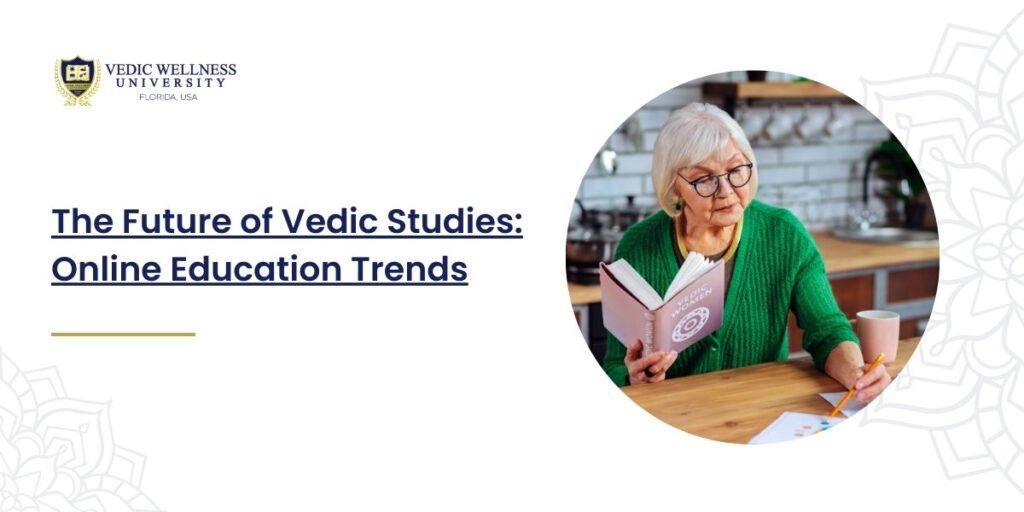
विद्यां चाविद्यां च यस्तद्वेदोभयं सह। अविद्यया मृत्युं तीर्त्वा विद्ययाऽमृतमश्नुते।। (Vidyaam chaavidyaam cha yastad vedobhayam saha, Avidyayaa mrityum teertvaa vidyayaa’mritam ashnute.) “He who knows both knowledge and ignorance together, by ignorance crosses beyond death and by knowledge attains immortality.” – Isha Upanishad 11 Introduction The world is rapidly changing, and education is no exception. With the advent of technology and digital platforms, the field of education has undergone a significant transformation, bringing knowledge closer to seekers across the globe. In this evolving landscape, the importance of Vedic studies is becoming increasingly apparent as more people seek wisdom and spiritual fulfillment from ancient texts. The demand for Vedic studies online is growing, as students worldwide are discovering the benefits of learning about Vedic wisdom, Ayurveda, yoga, astrology, and other traditional Indian sciences from the comfort of their homes. This blog will explore the future of Vedic studies in the digital age, focusing on the trends in online education that are shaping the learning experience. It will also cover how Vedic Wellness University (VWU) is at the forefront of this movement, offering comprehensive and accessible courses to a global audience. From Ayurveda to Sanskrit, from Astrology to Vaastu, VWU’s commitment to Vedic studies ensures that ancient wisdom remains relevant and accessible in modern times. The Principles of Ayurveda and Their Connection to Vedic Studies Ayurveda, or the “Science of Life,” is an ancient system of natural healing that has its roots in the Vedic tradition. It is based on the principles of maintaining balance within the body, mind, and spirit, aligning with the natural laws of the universe. Ayurveda is not just a medical practice; it is a holistic approach to health that encompasses diet, lifestyle, yoga, and meditation. The Basic Principles of Ayurveda By integrating Ayurveda into Vedic studies, students gain a holistic perspective on health and well-being that transcends physical wellness, touching upon the realms of the mind and spirit. The Rise of Online Education in Vedic Studies With the growing global interest in ancient wisdom and spiritual practices, there is a significant shift towards Vedic studies online. As digital platforms become more sophisticated, the ability to offer comprehensive, accessible, and interactive learning experiences is revolutionizing the field of education. Key Trends in Online Education for Vedic Studies The Significance of Vedic Studies Online for Modern Learners As the world becomes more interconnected, the need for holistic education that integrates spiritual, intellectual, and emotional growth is more pressing than ever. The trend of Vedic studies online meets this need by providing a platform for learners to explore ancient wisdom in a contemporary context. Key Benefits of Studying Vedic Sciences Online Vedic Wellness University: Leading the Way in Online Vedic Education Vedic Wellness University (VWU) is dedicated to promoting Vedic knowledge and ancient Indian philosophy through its comprehensive online programs. By embracing modern technology and digital platforms, VWU ensures that ancient wisdom is accessible to learners worldwide, fostering a global community of Vedic scholars and practitioners. Courses Offered by Vedic Wellness University This course introduces students to the basics of Vedic sciences, including Ayurveda, Yoga, and Vedic Astrology. It is designed for beginners who want to explore the foundational concepts of Vedic wisdom. These programs delve deeper into specialized areas such as Vedic Mathematics, Sanskrit, Vaastu, and Astrology. They provide comprehensive knowledge and practical skills for those looking to build a career in Vedic sciences or pursue further research. For advanced learners and researchers, this program offers the opportunity to conduct original research on topics related to Vedic studies, contributing to the academic and spiritual understanding of these ancient traditions. VWU collaborates with educational institutions worldwide, offering an associate program that allows these institutions to provide specialized Vedic courses to their students. How to Enroll in Vedic Wellness University Courses? Enrolling in VWU’s online courses is simple and user-friendly. Interested students can visit the university’s website, browse through the available programs, and choose the course that aligns with their interests and career goals. With flexible schedules, a rich repository of study materials, and expert faculty guidance, VWU ensures a seamless learning experience. Conclusion The future of Vedic studies lies in the seamless integration of ancient wisdom with modern technology. As the trend of Vedic studies online continues to grow, institutions like Vedic Wellness University are leading the way in making these profound teachings accessible to learners around the world. By offering comprehensive, flexible, and interactive courses, VWU is not just preserving the rich heritage of Vedic knowledge but also ensuring its relevance for future generations. As we embrace this new era of digital education, the timeless wisdom of the Vedas, Ayurveda, and other Vedic sciences will continue to inspire and guide individuals toward a path of holistic wellness, self-discovery, and spiritual growth. सत्यमेव जयते नानृतं (Satyameva Jayate Nanritam) “Truth alone triumphs, not falsehood.” – Mundaka Upanishad 3.1.6

